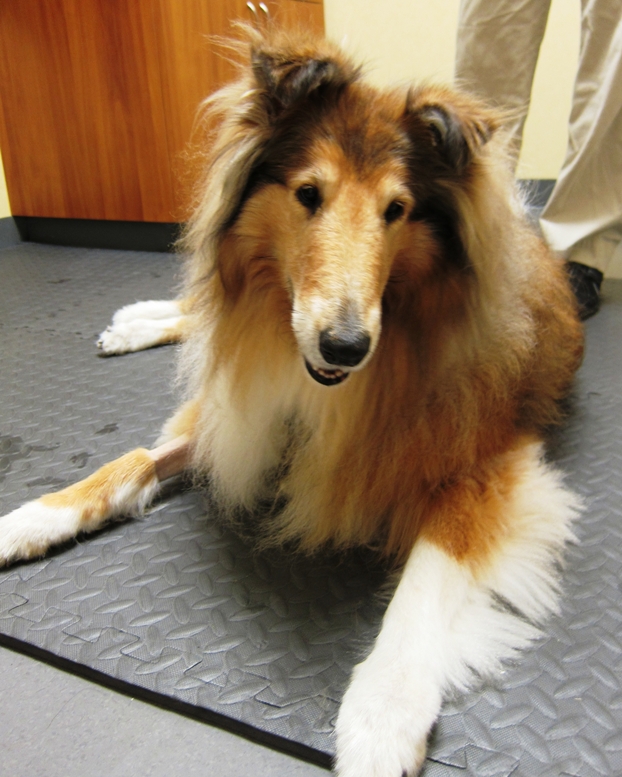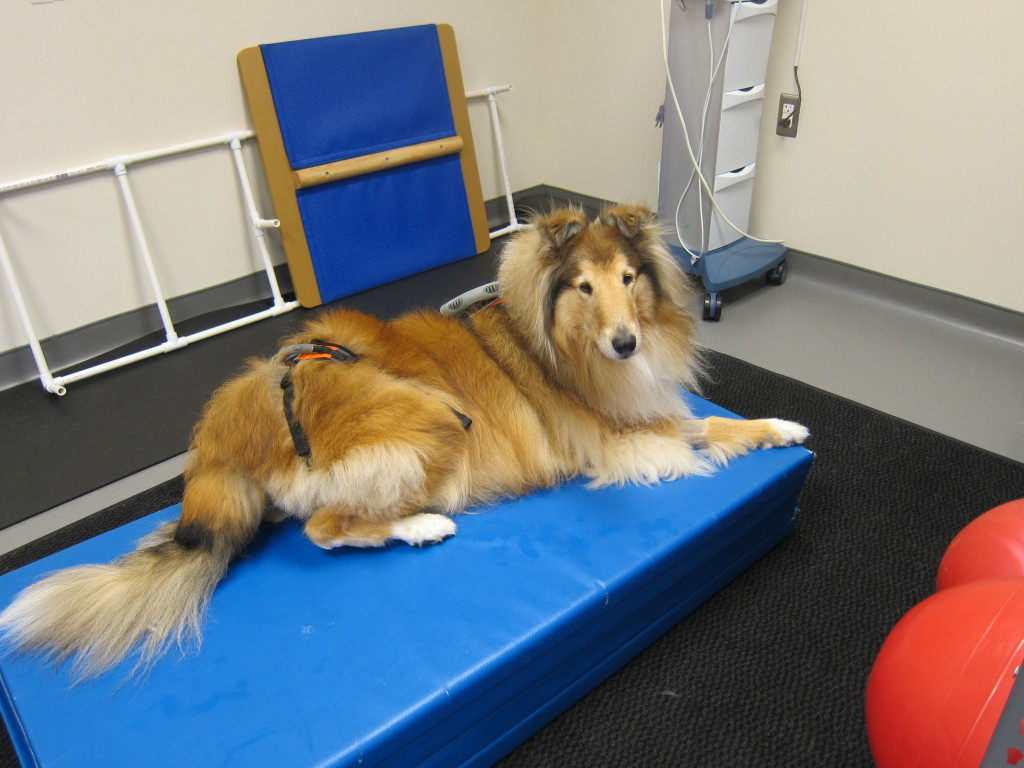Dora’s Story is All About Teamwork, Trust and Communication
Featured at June 4 Animal Survivor Event
2015 ACVIM Forum, Indianapolis Convention Center
(Indianapolis, Ind.) For Theresa and Tom McKee, June 15, 2013 is a date they’ll never forget. The West Bloomfield, Mich., couple fed Dora, their 8-year-old rough collie that Saturday morning and let her out for a brief time.
“When she came back in she rested in front of the door wall to watch for squirrels,” recalls Theresa. “Shortly after, I was in another room when I heard her whimpering, so I went to see what was wrong.”
What she saw was enough to send any dog owner into a state of alarm.
“She had thrown up her food and was thrashing on the floor, unable to stand, her head tilted to the side and her eyes rolling. I was very scared and knew she needed immediate attention. I called Tom and he held her head to keep it from hitting the floor.”
 The couple quickly loaded her into the car and rushed her to their primary veterinarian, Dr. Andrea Putt, of Commerce Village Veterinary Hospital, in Commerce, Mich., about 10 minutes away.
The couple quickly loaded her into the car and rushed her to their primary veterinarian, Dr. Andrea Putt, of Commerce Village Veterinary Hospital, in Commerce, Mich., about 10 minutes away.
Observing the severity of the situation, Putt was concerned about the possibility of a neurological problem. Dora had no history of prior seizures and had always been healthy prior to this episode.
After conferring with the McKees, Putt recommended transferring Dora to the nearby Animal Neurology & MRI Center in Commerce, Mich., where the staff could immediately begin advanced diagnostics and provide 24-hour care for the 80-pound dog.
After ACVIM Board-certified neurologist Dr. Michael Wolf completed his neurological exam, he knew that Dora had a central balance disturbance and would need an MRI (Magnetic Resonance Imaging) of her brain in order to determine the exact cause of her symptoms.
Dora was given general anesthesia and an MRI test was conducted revealing she had suffered a stroke to her cerebellum. Next, she was started on IV fluid therapy to keep her hydrated, since she was too dizzy to eat. It also meant bladder management because the dog was unable to walk outside. The facility’s vestibular rehabilitation program allows the staff to medically control the dizziness and nausea while it works to rehabilitate the system, helping maintain muscle mass and preventing against secondary injuries that can occur in a non-ambulatory pet. Consequently, Dora was rotated every four hours to prevent bed sores and received passive range of motion to keep her muscles and joints healthy.
Overall, she was hospitalized two weeks for extensive nursing care and rehabilitation.
“A unique characteristic of our center,” says Wolf, “is that we have emergency, neurology and ER clinicians working together under one roof. This meant Dora could get all the care she needed without having to travel to several places. That was particularly important because of her vertigo.”
Both Wolf and Putt cite the McKees’ commitment to Dora’s welfare as critical to her eventual recovery. Just like human rehab programs, she required physical therapy two to three times weekly for two and a half months.
 She was given a combination of manual therapies, assisting in turning from lateral to sternal, exercise ball, assisting in standing, then walking with slings and harnesses and later underwater treadmill exercises, adds Wolf. The exercise regimen was conducted both at the veterinary hospital and home. Acupuncture was also part of the therapy package.
She was given a combination of manual therapies, assisting in turning from lateral to sternal, exercise ball, assisting in standing, then walking with slings and harnesses and later underwater treadmill exercises, adds Wolf. The exercise regimen was conducted both at the veterinary hospital and home. Acupuncture was also part of the therapy package.
Wolf classifies Dora’s health today as “good, with minor residual neurological deficits from the stroke.”
Recovery, he says, depends on the severity of those deficits, the areas of the nervous system affected, type of injury and time. The quick response by the McKees and Putt allowed treatment to begin immediately, which aided in the dog’s recovery.
Putt lauds the McKees’ “unwavering commitment” to Dora. “They supported her in every way. In my 23 years as a veterinarian I have never seen a case like Dora, as she is truly a survivor.”
Dora, the McKees and the veterinary treatment team will be introduced at the 2015 ACVIM Forum in Indianapolis 10 a.m. Thursday, June 4. This special Animal Survivor event will be held in the Indiana Convention Center exhibit hall and the emcee will be Tim Doty, morning/noon news anchor for WTTV Indianapolis. Members of the media are invited to attend.
Media Note: Accredited members of the media may attend the 2015 ACVIM Forum at no charge. However, you are required to register with the ACVIM. For media registration, please fill out a registration form or contact Laurie Nelson at Laurie@ACVIM.org or 303.231.9933 Ext. 101.
# # #
About the American College of Veterinary Internal Medicine (ACVIM)
The American College of Veterinary Internal Medicine (ACVIM) is a nonprofit organization dedicated to improving the lives of animals and people through education, training and certification of specialists in veterinary internal medicine, discovery and dissemination of new medical knowledge, and increasing public awareness of advances in veterinary medical care.
The ACVIM hosts the ACVIM Forum, an annual continuing education meeting where cutting-edge information, technology and research abstracts are showcased for the veterinary community. More than 3,200 veterinary specialists, veterinarians, technicians and students attend.
“Visit Indy is thrilled to welcome the American College of Veterinary Internal Medicine to Indianapolis for their 2015 ACVIM Forum,” said Chris Gahl, Vice President of Marketing and Communications at Visit Indy. “We look forward to welcoming more than 3,200 attendees who will generate more than $4.2 million in economic impact for central Indiana.”
The ACVIM is the certifying organization for veterinary specialists in cardiology, large animal internal medicine, neurology, oncology and small animal internal medicine.
To find an ACVIM specialist in your area, please visit www.ACVIM.org.

